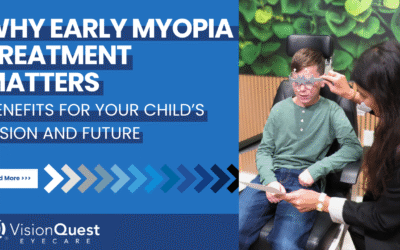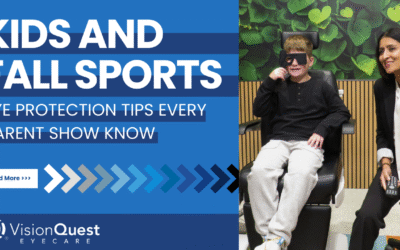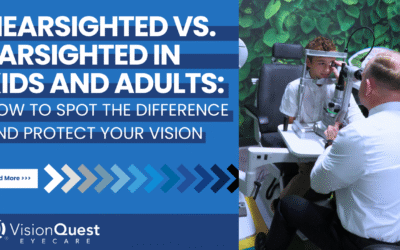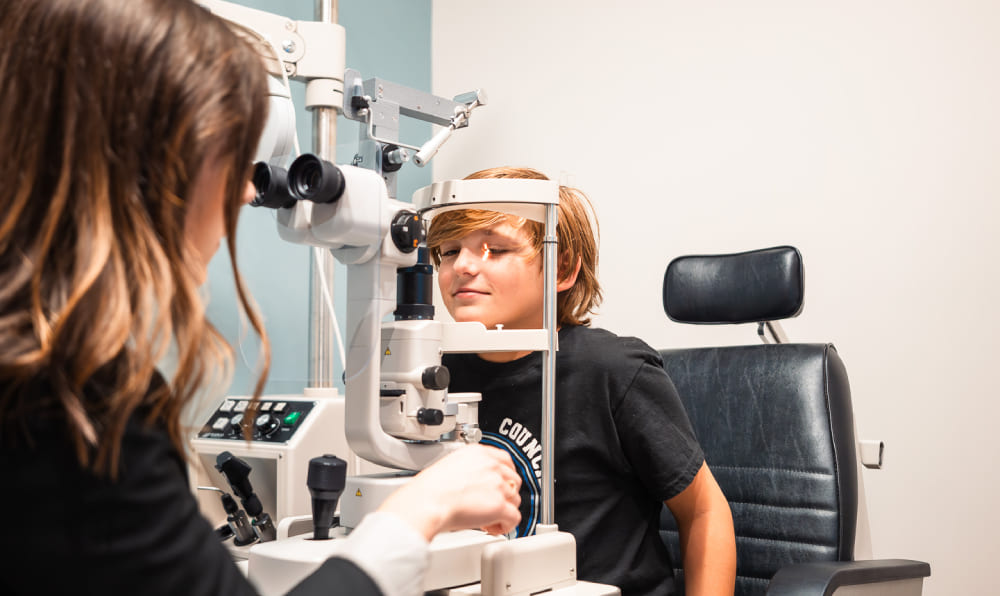
Healthy Vision Starts Early.
We Make It Fun, Comfortable, and Easy.
At VisionQuest Eyecare, we believe great eye care for children begins with trust, compassion, and a little bit of fun. Our team understands that kids don’t just need an eye exam, they need an experience that helps them feel safe, curious, and cared for.
From their very first visit, our goal is to make your child’s appointment something they actually look forward to. We’ve created a welcoming, kid-friendly environment filled with friendly faces and gentle communication, so every child leaves feeling confident and comfortable.
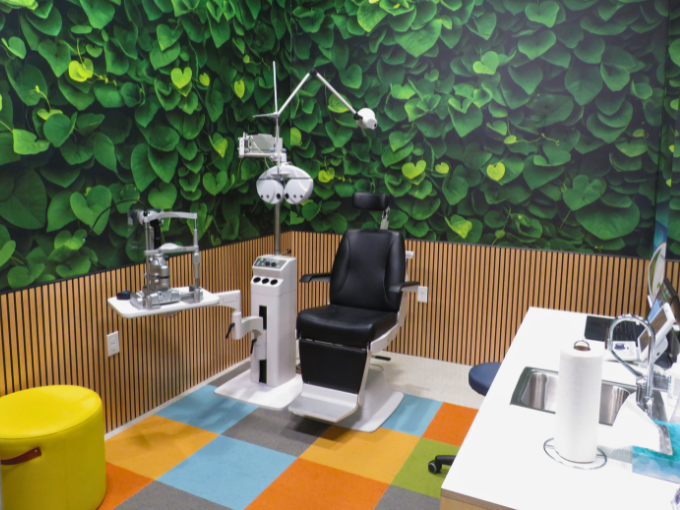
A Great Eye Exam Starts with the Right Environment
At VisionQuest, we know that children see the world differently, and that includes their doctor’s office. That’s why our exam rooms are designed to spark curiosity, not anxiety.
From bright, welcoming spaces to friendly staff who specialize in pediatric care, every detail is built around helping kids feel comfortable and confident.
What A Kid’s Exam With VisionQuest Looks Like
Every exam begins with connection and comfort. Our doctors take time to understand your child’s needs, then perform a thorough assessment of their vision and overall eye health. We look for early changes in how their eyes focus, track, and develop, helping to prevent problems like childhood Myopia before they begin. You’ll leave with answers, guidance, and confidence in their care.
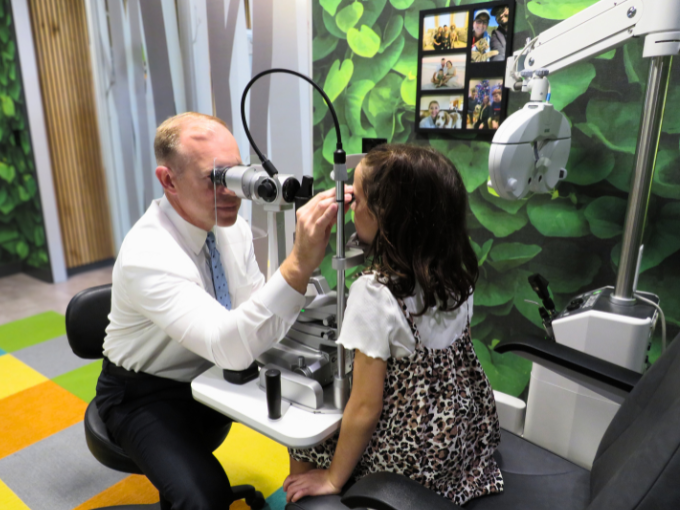
Pediatric Eye Exams Matter
A child’s vision changes quickly as they grow, and even small issues can affect how they learn, play, and see the world. Annual eye exams help us catch those changes early—often before your child notices a problem. Regular visits to VisionQuest ensure healthy eye development, clear sight in the classroom, and lasting confidence in every area of life.
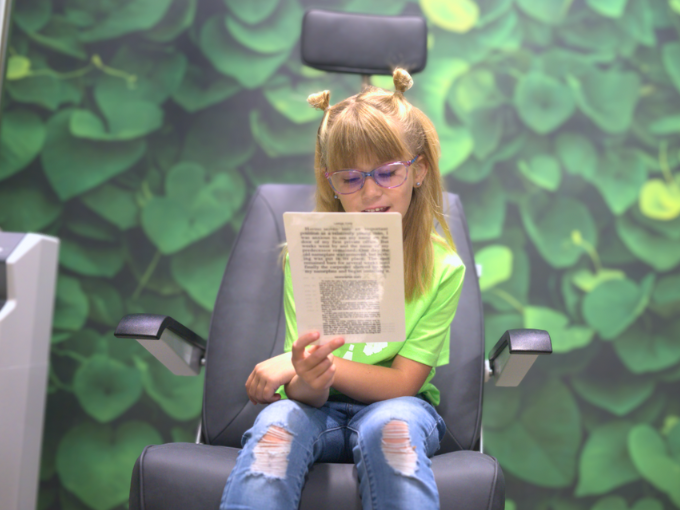
Understanding Myopia in Children
Nearly one in three children develop myopia, a growing trend in the U.S. and worldwide. Myopia (also known as nearsightedness) means the eye focuses images in front of the retina, making distant objects appear blurry while close objects remain clear.
In kids, myopia often begins during the school years and may worsen over time, especially without early detection and care. By offering proactive myopia treatment options, VisionQuest helps slow progression and protect your child’s long-term eye health.
How We Treat Myopia
At VisionQuest, we’ve partnered with Treehouse Eyes, the national leader in childhood myopia management, to bring proven, kid-friendly treatment options right here to our community. We are currently the only Treehouse Eyes provider in Indiana.
Through personalized care plans, we help slow the progression of nearsightedness using safe, effective methods tailored to each child’s needs. View our Myopia Management page to read about our solutions.
Our approach is gentle, comfortable, and designed to fit seamlessly into your child’s routine. By managing myopia early, we can help preserve their long-term vision health and keep their world in focus, today and for years to come.
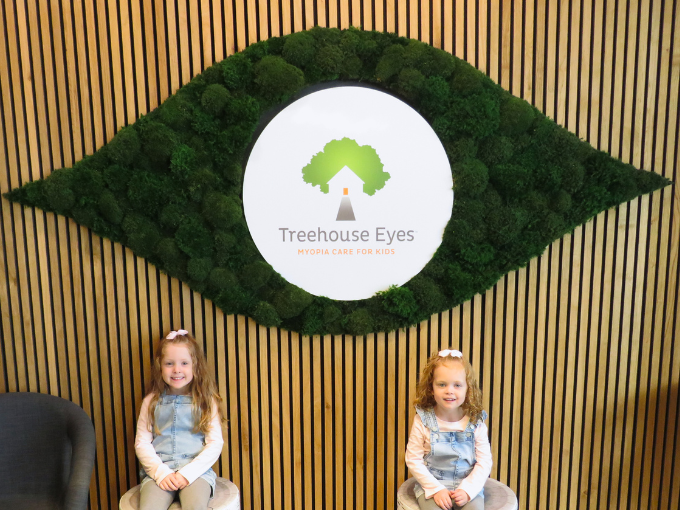
What Our Young Patients Are Saying
Don’t just take it from us, hear it from the families who’ve experienced the difference. These real stories from our myopia management patients show how clear vision and compassionate care can change the way kids see the world.
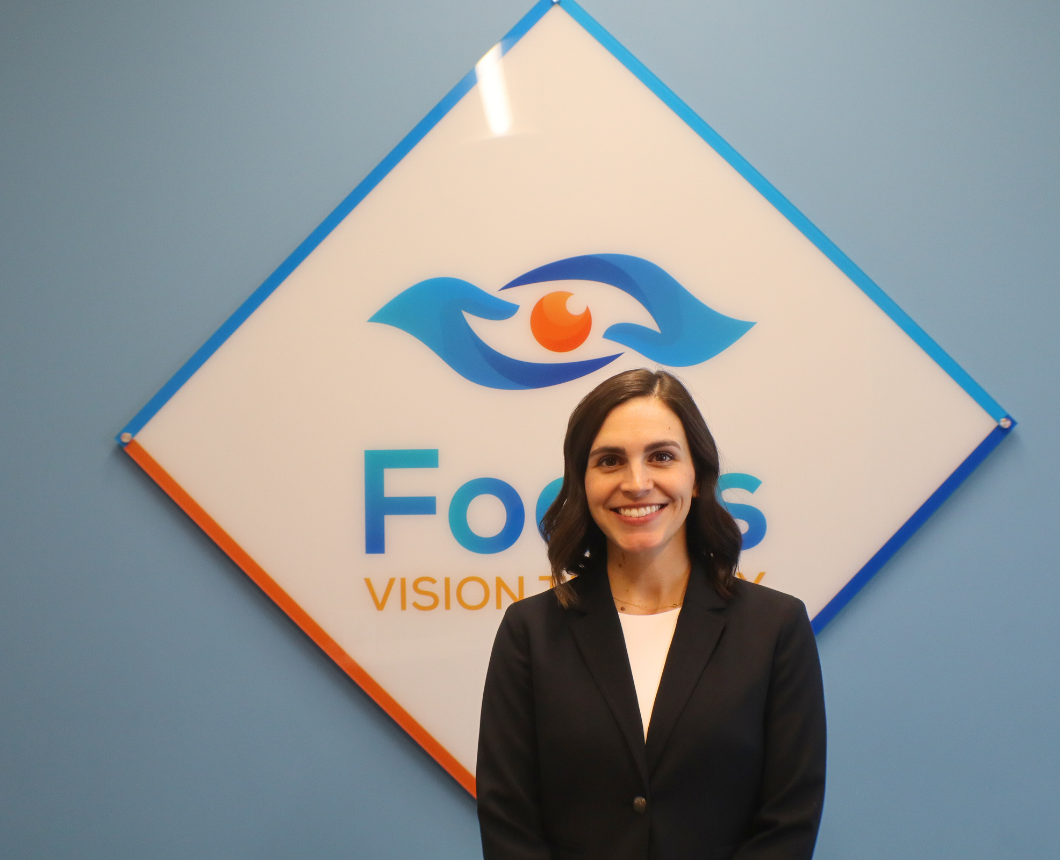
Expanding Care Beyond Myopia Management
Additionally, at both of our VisionQuest Eyecare locations, we offer advanced solutions beyond myopia treatment to support every aspect of your child’s visual development. For children who struggle with focusing, reading, or eye coordination, our vision therapy program, Focus Vision Therapy, provides customized care to strengthen how their eyes and brain work together.
What is Vision Therapy?
Vision therapy is like physical therapy, but for the eyes and brain. It helps children strengthen how their eyes work together to focus, track, and process visual information, skills that are essential for reading, learning, and coordination.
Many kids who struggle with attention, reading comprehension, or frequent headaches may actually be experiencing a vision issue that isn’t caught by a standard eye exam. Through a series of guided, customized activities, vision therapy helps improve these visual skills and gives kids greater comfort, confidence, and success in school and daily life.
Why Choose Us?
At VisionQuest, we don’t just care for eyes, we know your eyes. Our pediatric specialists combine advanced technology, years of experience, and genuine compassion to deliver exceptional care for every child who walks through our doors.
We take time to listen, to educate, and to create an experience that helps kids feel comfortable, confident, and excited to take care of their vision. From first exams to advanced therapies, VisionQuest provides complete, compassionate eye care that grows with your family.
Because at VisionQuest, your child’s vision isn’t just our focus, it’s our promise.
Frequently Asked Questions
At what age should my child have their first eye exam?
The American Optometric Association recommends a child’s first eye exam at 6–12 months, again at 3 years, and then before starting kindergarten. Early exams help detect vision issues before they impact learning or development. Read more about the importance of early exams in our article: Why Vision Screening At School Aren't Enough
How often should my child have an eye exam?
After the first few visits, children should have a comprehensive eye exam every year, or more frequently if they wear glasses, have vision problems, or a family history of eye conditions. Read more: How Often Should You Really Get An Eye Exam?
What’s the difference between a vision screening and a comprehensive eye exam?
Vision screenings (like those at schools or pediatricians’ offices) only test basic visual acuity. Comprehensive exams, like those at VisionQuest Eyecare, assess eye health, depth perception, eye alignment, and more. Read more: Vision Screenings vs. A Comprehensive Eye Exam
What are signs my child might have a vision problem?
Watch for squinting, frequent eye rubbing, sitting too close to screens, avoiding reading, headaches, or complaints about blurry vision. These can all signal an underlying issue. Read more: Vision Problems In Children: 5 Early Signs Parents Shouldn't Ignore
Can poor vision affect my child’s school performance?
Absolutely. Children with uncorrected vision problems may struggle with reading, writing, focusing on the board, or participating in class, all of which can impact academic success. Read more here: Is Your Child Ready To Learn?
Does my child need glasses even if they see well up close?
Yes, especially if they’re nearsighted (myopic) and can’t see clearly at a distance. Children often adapt without realizing there's a problem, so routine exams are critical. Read more about our Nearsightedness (Myopia) practices: Myopia Management
What types of eye conditions are common in children?
Common conditions include:
- Myopia (nearsightedness)
- Hyperopia (farsightedness)
- Astigmatism
- Amblyopia (lazy eye)
- Strabismus (eye misalignment)
- Convergence insufficiency
- Allergic conjunctivitis
Can my child wear contact lenses?
Many children can safely wear contacts, especially active kids or athletes. The right age depends on maturity and ability to care for lenses. We offer Contact Lens Exams specifically for kids and teens.
What is myopia and why is it becoming more common?
Myopia is nearsightedness, where distant objects appear blurry. It’s on the rise due to more screen time and less outdoor activity. It often worsens during school years, making early detection and Myopia Management essential. Read more about Myopia.
How can myopia progression be slowed?
We offer several myopia control options including:
- Ortho-K (overnight lenses)
- Soft multifocal contact lenses
- Low-dose atropine eye drops
These methods help slow the progression of nearsightedness in children. Learn more about our myopia treatment options: Myopia Management
What is vision therapy and how does it help?
Vision Therapy is a structured, non-surgical program that trains the eyes and brain to work together. It helps with problems like:
- Difficulty tracking while reading
- Eye teaming or focusing issues
- Visual processing delays
It's especially beneficial for children struggling in school despite having 20/20 vision. Learn more about our Focus Vision Therapy wing: https://focusvisiontherapyin.com/for-patients/
How do I know if my child needs vision therapy?
Children don’t always know how to describe visual struggles, and often, even standard vision tests may miss the issue. Vision therapy can be highly beneficial for children who show signs such as:
- Avoiding reading or homework
- Skipping or repeating lines when reading
- Reversing letters like "b" and "d"
- Frequent headaches or eye rubbing
- Poor hand-eye coordination
- Difficulty copying from the board
Vision therapy is especially helpful for children with learning challenges, including:
- Learning disabilities
- Dyslexia
- ADHD
- Sensory processing disorders
- Autism spectrum disorders
These children may struggle with visual tracking, eye teaming, focusing, or visual processing skills, all of which are essential for reading, writing, and comprehension. While vision therapy doesn't "cure" dyslexia or autism, it can address visual barriers that make learning even more difficult, improving a child’s comfort, focus, and confidence in the classroom.
If you suspect your child’s learning difficulties may be vision-related, we offer in-depth evaluations to determine whether Vision Therapy is the right approach.
Is screen time affecting my child’s eyes?
Yes. Prolonged screen use can lead to digital eye strain, dry eyes, and increased risk of myopia. Encourage the 20-20-20 rule: every 20 minutes, look 20 feet away for 20 seconds. Read more about screen time effects.
Can allergies affect my child’s eyes?
Definitely. Red, itchy, or watery eyes may be caused by seasonal allergies or indoor irritants. A pediatric eye exam can distinguish allergies from infections or chronic dry eye.
What’s the difference between pink eye and allergies?
Allergic conjunctivitis is usually itchy and affects both eyes, while infectious pink eye often includes discharge, crusting, and may start in one eye. Proper diagnosis ensures the right treatment. Learn more about allergy eyes here.
Should my child wear protective eyewear for sports?
Yes. Regular glasses aren’t impact-resistant. We recommend sports goggles or polycarbonate lenses to prevent injuries during physical activities. Read more about sports and eye health here.
Are pediatric eye exams covered by insurance?
Many vision plans cover annual eye exams for children. Our team can help verify your coverage and explain options.
How do I prepare my child for their first eye exam?
Explain it like a fun check-up! Let them know they’ll look at shapes, colors, and letters. Bring their favorite toy or snack to help them feel comfortable. Learn more about what a pediatric eye exam looks like here.
How early can eye problems affect development?
Vision is closely tied to early development, learning, motor skills, and speech can all be affected by poor vision. That’s why early exams (even before age 1) are so important.
Where can I schedule a pediatric eye exam?
You can schedule directly through our contact page or call either of our locations in Greenwood or Fishers. Our team specializes in child-friendly care and making every visit stress-free.
Related Blogs
Why Early Myopia Treatment Matters: Benefits for Your Child’s Vision and Future
If your child is struggling to see clearly at a distance, they may be experiencing myopia, or...
Kids + Fall Sports = Eye Protection Tips Every Parent Should Know
As fall sports kick into high gear; whether it's soccer, football, cross country, or even tennis;...
Nearsighted vs. Farsighted in Kids and Adults: How to Spot the Difference and Protect Your Vision
If your child is squinting to see the board at school, or you find yourself holding a menu at...

